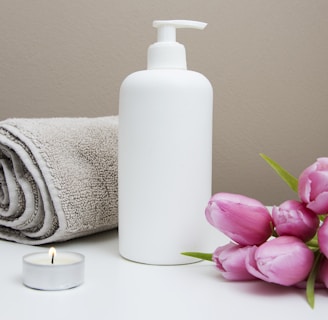Debunking 5 Popular Skincare Myths
Robyn Scharman
6/4/20234 min read


The world of skincare is awash with information, advice, and trends, especially from social media influencers.. From ancient remedies to cutting-edge technology, it's easy to be overwhelmed by the wealth of skincare myths and misconceptions that abound. To maintain healthy and radiant skin, it's crucial to separate fact from fiction. Today I'll be tackling and debunking five of the most popular skincare myths.
Myth 1: "You should wash your face frequently to prevent acne."
One of the most common skincare myths is the belief that frequent washing will prevent acne. The truth is, over-cleansing can actually worsen the condition of your skin. Excessive washing strips the skin of its natural oils, which can lead to dryness, irritation, and even increased acne. Instead, opt for a gentle, sulfate-free cleanser, and wash your face twice a day. It's essential to strike a balance and not overdo it. Going along with this myth is that you don't need moisturizer if you have acne-prone or oily skin. WRONG!!!
Myth 1 A: Using a moisturizer is often a point of confusion for those with acne-prone or oily skin. Many people believe that applying moisturizer may exacerbate acne or make oily skin even oilier. However, using a moisturizer is still essential for people with acne or oily skin for several important reasons:
Maintains Skin Barrier: Acne treatments, such as benzoyl peroxide, salicylic acid, or retinoids, can be drying and may compromise the skin's natural moisture barrier. Using a moisturizer helps replenish this barrier, preventing excessive dryness, flakiness, and irritation.
Balances Oil Production: Paradoxically, over-drying the skin can lead to an increase in oil production as the skin tries to compensate for the lack of moisture. By applying a suitable moisturizer, you can help regulate the skin's oil production, reducing the risk of clogged pores and breakouts.
Prevents Irritation: Harsh acne treatments can be irritating and may lead to redness, stinging, or peeling. A moisturizer with soothing and calming ingredients can help minimize these side effects and improve overall comfort.
Hydrates the Skin: Acne-prone skin still requires hydration. Dehydrated skin can become more prone to breakouts and inflammation. A lightweight, non-comedogenic moisturizer can provide the necessary hydration without clogging pores.
Improves Skin Texture: A well-moisturized skin surface is smoother and healthier in appearance. A smoother texture can help your makeup apply more evenly and reduce the visibility of acne scars and blemishes.
Supports the Healing Process: Moisturized skin is better equipped to heal itself and recover from breakouts. It can help reduce the chances of post-inflammatory hyperpigmentation and scarring.
Sun Protection: Many moisturizers come with added SPF (sunscreen), which is essential for everyone, including those with acne or oily skin. Sun exposure can worsen acne and lead to skin damage. Using a moisturizer with SPF can offer both hydration and sun protection.
When selecting a moisturizer for acne-prone or oily skin, it's crucial to choose a product that is non-comedogenic, meaning it won't clog pores. Look for labels indicating "oil-free," "non-comedogenic," or "for acne-prone skin." Gel-based moisturizers and those containing ingredients like hyaluronic acid are often well-tolerated by oily and acne-prone skin.
Myth 2: "Natural ingredients are always better for your skin."
While natural ingredients can be excellent for your skin, it's essential to remember that not all natural substances are safe or effective. Poison ivy, for example, is natural but certainly not something you want on your skin. Conversely, many synthetic ingredients have been thoroughly researched and proven safe for use in skincare products. The key is to research, read labels, and understand the specific needs of your skin to make informed decisions.
Myth 3: "You don't need sunscreen on cloudy days or indoors."
This is a dangerous myth that can have severe consequences for your skin's health. UV rays from the sun can penetrate clouds and windows, causing premature aging and increasing the risk of skin cancer. Even on cloudy days or when you're indoors, it's essential to apply sunscreen with broad-spectrum protection to shield your skin from harmful UV rays. Don't let cloud cover or a windowpane lull you into a false sense of security.
Myth 4: "A higher price tag equals better skincare."
Expensive skincare products can be tempting, but they don't necessarily equate to better results. Quality skincare doesn't always come with a hefty price tag. What matters most is the ingredients and formulation. Look for products that match your skin type and address your specific concerns. Often, affordable brands offer effective solutions with the same active ingredients found in pricier alternatives.
Myth 5: "You can shrink your pores."
Many products and treatments claim to shrink or minimize pores, but the reality is quite different. You can't permanently change the size of your pores because they are largely determined by genetics. However, you can take steps to keep them clean and less noticeable by maintaining a consistent skincare routine, using exfoliants, and avoiding pore-clogging products. Pore size might not change, but their appearance can be improved.
Skincare is an ever-evolving field, and it's crucial to base your routine on evidence-backed information rather than myths and misconceptions. Debunking these popular skincare myths can help you make more informed decisions for your skin's health. Remember to consult with a licensed skincare professional to address your specific concerns, and to tailor your skincare regimen to your unique skin type and needs. By doing so, you'll be well on your way to achieving the healthy, radiant skin you desire.
Address
Bliss Studios
1290 S. 500 W.
STE 9
Bountiful, UT 84087
Stay in the Loop
Contact
Call or Text Robyn
801-425-6802
Follow Me On Social Media
Get the latest savings and promos when you sign up
